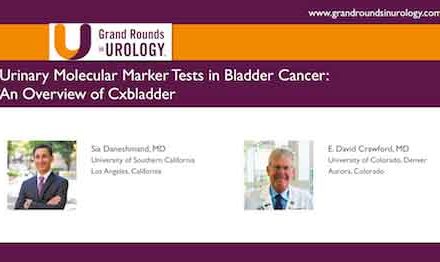Jennifer A. Linehan, MD, presented “Utilizing Molecular Characterization of Invasive Bladder Cancer: What It Means Now and In the Future” at the 6th International Bladder Cancer Update on November 20, 2022, in Scottsdale, Arizona.
This content is available free to the GRU Community. Login or create an account to view it.
How to cite: Linehan, Jennifer A. “Utilizing Molecular Characterization of Invasive Bladder Cancer: What It Means Now and In the Future.” November 2022. Accessed Jun 2025. https://grandroundsinurology.com/utilizing-molecular-characterization-of-invasive-bladder-cancer-what-it-means-now-and-in-the-future/
Utilizing Molecular Characterization of Invasive Bladder Cancer: What It Means Now and In the Future – Summary
Dr. Jennifer A. Linehan, MD, discusses molecular characterization in invasive bladder cancer, delving into the current applications and future implications of molecular profiling. She begins by outlining the significance of molecular characterization in understanding the heterogeneity of invasive bladder cancer. She discusses key molecular subtypes, such as basal and luminal, and their distinct genetic and molecular features. These subtypes, identified through techniques like RNA sequencing and genomic profiling, provide critical information about tumor behavior and potential therapeutic targets.
Dr. Linehan elaborates on how molecular profiling influences treatment decisions. For example, tumors with FGFR3 mutations may respond well to FGFR inhibitors, while those with high PD-L1 expression are candidates for immune checkpoint inhibitors. Dr. Linehan emphasizes the role of next-generation sequencing (NGS) in identifying actionable mutations and guiding personalized treatment strategies. Reviews of recent clinical trials highlight the efficacy of targeted therapies based on molecular alterations.
Dr. Linehan also addresses the prognostic value of molecular markers, and how certain genetic alterations correlate with patient outcomes, helping to stratify patients by risk and tailor treatment plans accordingly. She provides examples of patients with luminal subtypes who might have better responses to chemotherapy, while basal subtypes could benefit more from immune-based therapies.
Looking to the future, Dr. Linehan explores emerging technologies and their potential to revolutionize bladder cancer care. These include liquid biopsy techniques, which allow for noninvasive monitoring of tumor dynamics and early detection of resistance mechanisms. She also highlights the potential of integrating multiomics approaches, combining genomic, transcriptomic, and proteomic data to achieve a more comprehensive understanding of tumor biology.
About the 6th International Bladder Cancer Update:
The International Bladder Cancer Update (IBCU) is a CME conference focused on the diagnosis and treatment of bladder cancer. The conference offers medical professionals an opportunity to listen to updates from, and interact with, expert international faculty to improve knowledge and determine best treatment practices to improve patient outcomes. IBCU encompasses expert lectures, interactive discussions, a panel roundtable, debates, and case presentations. It is physician-led, multi-supported, and designed for urologists, urologic oncologists, and other healthcare professionals involved in the treatment of bladder cancer.
For further educational activities from this conference, visit our collection page.
ABOUT THE AUTHOR
Jennifer A. Linehan, MD, is a board-certified urologist and associate professor of urology and urologic oncology at the Saint John’s Cancer Institute in Santa Monica, California. She completed her medical degree as well as a general surgery internship and urology residency at the University of Arizona, where she also received the George M. Drach Award for the most compassionate urologic resident. She also received awards for research in diagnosis and management of kidney cancer. Most recently, she received the Harold H. Benjamin Innovation Award for compassion and dedication in cancer care. After her residency at the University of Arizona, Dr. Linehan completed a two-year fellowship in robotic urologic oncology at City of Hope.
Dr. Linehan’s current research focus is on molecular testing using miRNA and cfDNA in urine for tumor identification in renal tumors, 3D imaging to improve surgical outcomes, and new intracavitary therapy for urothelial carcinoma. She continues to practice general urology including complex robotic reconstruction, voiding dysfunction, and treatment of nephrolithiasis. In addition, Dr. Linehan has been involved in prostate cancer research and biomarker identification for this disease. She has authored papers, presented abstracts and research at conferences around the world, and continues to dedicate time to both science and clinical research. Dr. Linehan is certified by the American Board of Urology and is a member of the Society of Urologic Oncology, Endourological Society, American Urological Association, and the Western Section of the American Urological Association. She also has a lifelong love of animals, particularly rescue dogs. She dedicates time weekly to help educate less fortunate families and children.




